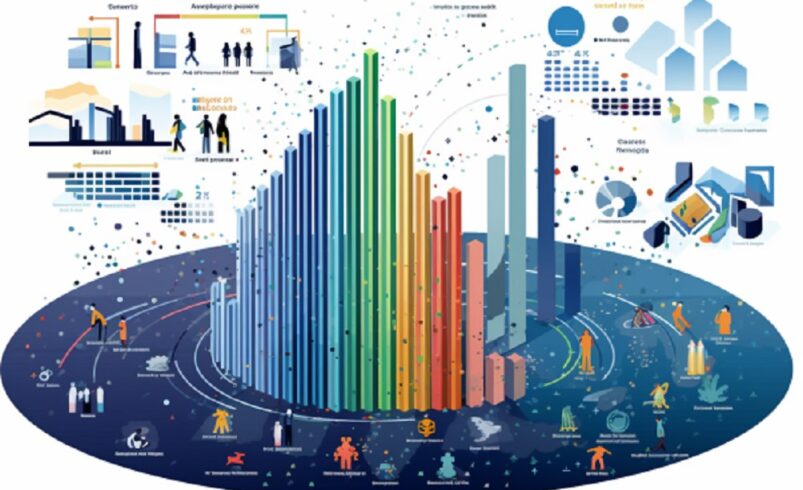A Beginner’s Guide To Big Data: All You Need To Know

Table of Contents
In the contemporary technological landscape, “big data” resonates with the complex world of information transcending traditional processing methods. This guide looks into the essence of big data, its sources, and the fundamental properties that define its magnitude and complexity.
Diverse Data Types
Big data encompasses various data types, each with unique challenges and opportunities. Structured data, characterized by its organized format, contrasts with semi-structured data, which lacks the rigidity of traditional databases but retains some organizational elements.
Unstructured data, on the other hand, defies specific formatting and includes sources like social media posts, images, and videos.
Sources And Categories Of Big Data
The proliferation of technology has expanded the horizons from which big data originates. Big data can be social, machine, and transactional data, each offering distinct insights into various realms.
Fundamental Properties Of Big Data
Big data encompasses five critical dimensions: Value, Volume, Velocity, Variety, and Veracity. Big data’s size, amount, speed, diversity, and reliability pose challenges and opportunities, defining its transformative potential.
Components Holding Big Data Together
Specialized tools and systems are integral to managing big data. Storage systems like the Hadoop Distributed File System (HDFS) cater to the massive volume of data.
At the same time, processing tools such as Spark and Apache Hadoop facilitate efficient analysis. NoSQL databases like Cassandra MongoDB offer flexibility with unstructured data, forming a robust foundation for the intricate world of big data.
Techniques And Technologies Driving Big Data
Beyond storage and processing, extracting value from big data demands specialized techniques. Data mining involves scrutinizing vast datasets to identify patterns and correlations, while big data analytics transforms raw data into understandable formats.
Cloud platforms, specialized software, and artificial intelligence (AI) contribute to the tools empowering organizations to harness the potential of big data.
Applications Of Big Data In DeFi And Web3
Big data catalyzes transformative applications in the Decentralized Finance (DeFi) and Web3 sectors.
Security And Fraud Detection
In the dynamic environment of DeFi, where transactions happen rapidly, big data analytics has become a powerful tool for security. By processing large numbers of transactions, big data algorithms can identify patterns and irregularities swiftly.
This is especially vital in fraud detection, ensuring the integrity of the financial ecosystem. Blockchain analysis firms, like Chainalysis, leverage big data capabilities to track the flow of cryptocurrencies, enhancing security measures within the DeFi space.
Decentralized Identity Management
Web3, with its emphasis on decentralization and user privacy, leverages big data for decentralized identity management. By using analytics to verify user credentials and protect digital identities on the decentralized web, big data ensures a secure and reliable system without relying on centralized authorities.
This application is instrumental in aligning with the principles of Web3.
Distributed Content Curation And Recommendation Systems
Web3 platforms generate vast amounts of user-generated content. Thus, they can use big data algorithms to analyze user behavior, preferences, and interactions to provide personalized content recommendations.
This enhances user engagement and ensures that content suggestions are tailored to individual preferences, contributing to a more satisfying user experience within the Web3 ecosystem.
Ethical Considerations: Security, Privacy, And Governance
With the importance of big data in modern businesses, ethical considerations surrounding security, privacy, and governance become paramount.
Data Security In DeFi And Web3
As big data becomes integral to DeFi and Web3, ensuring data security is paramount. Thus, robust encryption, intrusion detection systems, and regular vulnerability assessments are essential.
These safeguards are crucial for preventing unauthorized access and potential breaches as these ecosystems evolve.
Data Privacy
Since big data often contains personal information, safeguarding data privacy is a critical ethical consideration. In DeFi and Web3, where user data is central, innovative approaches to protecting user privacy become imperative to ensure ethical use of data.
Data Governance
Governance in the context of DeFi and Web3 involves establishing policies, procedures, and standards to manage data assets. Moreover, effective data governance ensures data quality, consistency, and controlled access.
Given the decentralized nature of these ecosystems, implementing robust data governance is crucial for maintaining the integrity and reliability of data.
Conclusion
Big data is a cornerstone of our digital evolution, offering insights, driving innovation, and shaping unparalleled user experiences. While challenges persist, the transformative potential of big data is monumental, ushering in the next wave of technological advancements.
Time Crypto Market offers content visibility for dozens of crypto enterprises, and you can be a part of our network! Reach out to us on our telegram chat for inquiries. The nature of cryptocurrencies is highly unpredictable; always perform your due diligence before any investment. Several articles on our site come from guest contributors or are commissioned pieces, not originating from Time Crypto Market's in-house writers. The perspectives shared in these articles might not necessarily align with those of Time Crypto Market. We do not assume responsibility for the veracity, caliber, promotions, offerings, or any other elements presented on our platform. Consult our comprehensive terms of service and disclaimer for more details.








